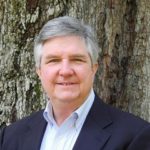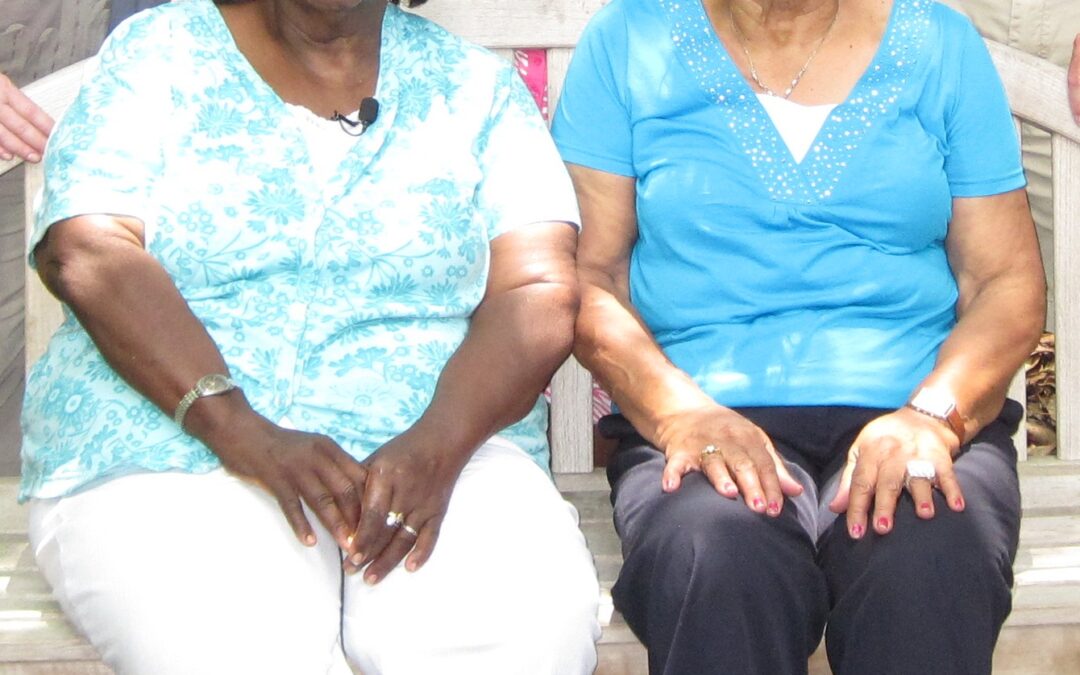First on Facebook – June 29, 2021
Lucille Blunt, above right, remembering her youth while living with her grandparents at Drayton Hall in the mid-20th century. Lucille was a friend of Annie Brown Meyers (shown left and interviewed in the previous Blog post):GWM: In your grandmother’s house at Drayton Hall, where did she cook?Lucille Blunt: Whether in the fireplace or on a wood stove, my grandmother could cook! At first, my grandmother cooked in the fireplace. She had a large, cast-iron frying pan with a lid. She made biscuits, which everybody loved, and she’d put hot coals on top of the lid. When she cooked rice or grits or whatever, she had something or other to set the pot on in the fireplace. She cooked all her meals in that fireplace. When she got a wood stove, it had four burners and a warmer on top, so when she’d cook a pie or cake or whatever, she put it up in the warmer.My favorites were her biscuits, potato pie, and potato pudding. The doctor wouldn’t let her eat grits so she had cream of wheat for breakfast and also ham, because the doctor said that ham was the only meat she could eat. For dinner, we’d have greens, okra, and whatever.For Sunday dinner, she’d kill a chicken, and we’d have fried chicken, or sometimes she would stew it down.We’d have vegetables like okra soup, greens, or string beans from the garden.GWM: Did you hear Gullah spoken?LB: When I got older, I heard about Gullah, but my grandparents didn’t speak it. They spoke regular English. I didn’t hear anyone around here speaking Gullah.GWM: Where did you go to church?LB: Olive Branch Baptist Church just up on Highway 61 was my grandmother’s church, so we went there. She sang in the choir, and my grandfather was on the usher roll. They were faithful to that.On Tuesday nights, my grandmother would go over to Magnolia Plantation for a prayer meeting, and on Thursday, my grandfather would go. Ladies on one night, men on the other. They weren’t special buildings, just one of those little tenant houses. I’d go with my grandmother. They’d sing and pray. No instruments or preacher. Just the ladies singing and praying and enjoying being with each other. I remember them singing “Precious Lord, Take My Hand,” “I Want Jesus to Walk with Me,” and other spirituals and hymns.Afterward, they’d shake hands, and we’d head back home to Drayton Hall.This is an excerpt from my book, “Drayton Hall Stories: A Place and Its People” due to be published this fall.
Preview my new book “Drayton Hall Stories: A Place and Its People”
 George W. McDaniel, Ph.D., is President of McDaniel Consulting, LLC, a strategy firm that helps organizations use history to build bridges within itself and to its broader constituents. The company’s tag line, “Building Bridges through History,” is grounded in McDaniel’s personal beliefs and his experience in site management, preservation, education, board development, fundraising, and community outreach. Rather than using history to divide us, he strives to help organizations use history, especially local history, to enhance cross-cultural understanding and to support local museums, preservation, and education. Dr. McDaniel led volunteer efforts with Emanuel AME Church and historical organizations in Charleston to use historic preservation to enhance racial reconciliation and healing. McDaniel is also the Executive Director Emeritus of Drayton Hall, a historic site in Charleston, SC, owned by the National Trust for Historic Preservation. He retired from Drayton Hall in 2015 after 25 years of distinguished service.
George W. McDaniel, Ph.D., is President of McDaniel Consulting, LLC, a strategy firm that helps organizations use history to build bridges within itself and to its broader constituents. The company’s tag line, “Building Bridges through History,” is grounded in McDaniel’s personal beliefs and his experience in site management, preservation, education, board development, fundraising, and community outreach. Rather than using history to divide us, he strives to help organizations use history, especially local history, to enhance cross-cultural understanding and to support local museums, preservation, and education. Dr. McDaniel led volunteer efforts with Emanuel AME Church and historical organizations in Charleston to use historic preservation to enhance racial reconciliation and healing. McDaniel is also the Executive Director Emeritus of Drayton Hall, a historic site in Charleston, SC, owned by the National Trust for Historic Preservation. He retired from Drayton Hall in 2015 after 25 years of distinguished service.
A frequent writer, speaker, and facilitator about such issues, he can be reached at gmcdaniel4444@gmail.com or through his website at www.mcdanielconsulting.net.
All images courtesy of the author unless otherwise noted.

 McDaniel Consulting LLC is a strategy firm that helps organizations use history to build bridges within itself and its broader constituents.
McDaniel Consulting LLC is a strategy firm that helps organizations use history to build bridges within itself and its broader constituents.